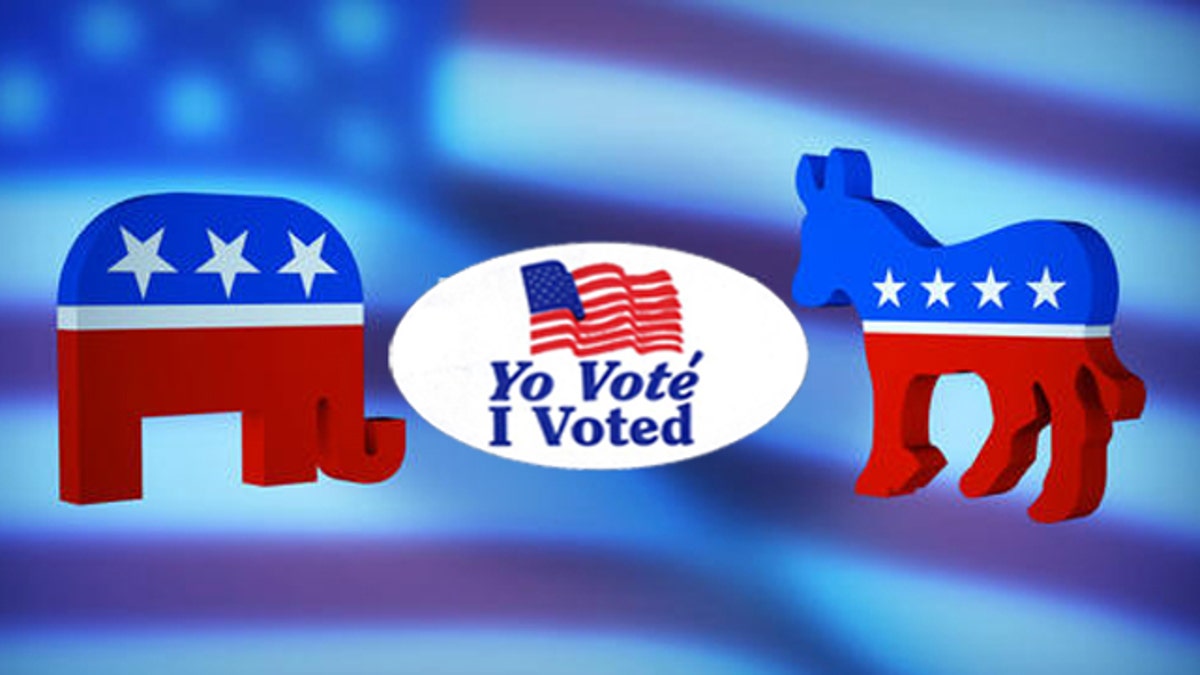
Republicans and Democrats are beginning their courtship of Latinos particularly early for the 2012 elections.
With a fervor normally unleashed closer to elections, Republicans and Democrats are making pitches to Latino voters, but both parties face skepticism.
In July, Republicans fired off a media ad blitz, aimed at Latinos -- which included ads in Spanish -- in Colorado, Nevada, New Mexico and Florida, states where Hispanics are a steadily growing part of the electorate.
The media campaign, by the Republican National Committee, told Hispanics that President Obama was destructive to the economy, and to Latinos’ financial wellbeing in particular. The ads say that Obama’s handling of the economy is why Latino unemployment stands at 11.6 percent, higher than the national average.
The Democrats quickly pushed back.
In their first ads for the presidential election, the Democratic National Committee targeted Latinos in virtually all the same geographical areas as the RNC’s campaign, with the message that Republicans have pushed to cut programs that are critical to Latinos.
In interviews, Democrats have also hammered away at the Republicans as anti-immigrant – in particular, anti-Hispanic.
Experts say the wooing has begun extraordinarily early, with the election more than a year away – and that both parties have their work cut out for them.
“Both have problems with Latino voters,” said Sylvia Manzano, a political science professor at Texas A & M University. “The Republicans have a hostility image they have to fend off. The Obama Administration set the bar very high, he made all these campaign promises and didn’t keep any of them.”
This is hardly the first time the Republicans and Democrats have said that it is important to them to reach Hispanic voters. But experts say this time, they might really mean it.
The 2010 Census, for one thing, was an eye-opener.
It showed that the Hispanic population grew to 50.5 million in 2010 from 35.3 million in 2000. About 21 million are eligible to vote.
And last year, Latinos showed that they could swing important elections, and that they were willing to back Republicans.
They helped put Nevada Sen. Harry Reid, whose re-election at times had seemed uncertain, back in office – a backlash, it was widely observed, against the Republican opponent, Sharron Angle. Angle pressed hard against undocumented immigrants, creating a furor among Latinos, who are 15 percent of Nevada’s electorate, when she did such things as put out ads featuring Latinos in police mug shots to make statements about immigration.
But Latino voters also helped propel Latino Republicans into office in Florida, New Mexico, and Nevada, among other places.
“The courting has definitely started earlier,” said Angelo Falcon, president and founder of the National Institute for Latino Policy, based in New York. “The Census numbers raised a lot of people’s consciousness about the potential of Latino voters.”
And Falcon agrees that the growing political bloc does not appear enthusiastic over either party.
“This is expected to be a very contentious race,” Falcon said. “So many people are down on Obama, the Republicans smell blood here.”
“The Republicans may be taking Hispanics more seriously, but the bottom line is the actual policies they’re pursuing,” he said. “The Republicans are so antagonistic to Latinos. Their policies attack the basic safety nets for our community – Social Security, Medicare, Medicaid. No matter how many friendly ads they put out there, it’s hard to change how they have treated our community.”
But others believe that Latinos are so disillusioned with Obama, who they overwhelmingly supported in 2008 -- and feel so taken for granted by Democrats in general -- that a strong Republican challenger could attract a large portion of Hispanic voters.
Critics of Republicans, said Alfonso Aguilar, executive director of the Latino Partnership for Conservative Principles, have valid arguments about how the party has alienated Latinos.
“But the president also has annoyed them,” said Aguilar, who served as chief of the Office of Citizenship in the George W. Bush administration. “He has pandered to them, been very condescending, and has not delivered. Latinos say he pushed healthcare, why didn’t push immigration?”
“Bush fought for immigration reform, even though he knew he didn’t have the votes” in 2007, he said. “He fought for it out of principle.”
The frustration over Obama and sense of betrayal among Latinos, Aguilar said, makes conditions ripe for a Republican candidate who supports comprehensive immigration reform, and has an appealing economic agenda, to do well in the 2012 election.
“That candidate is going to be very competitive and should be able to get 40 percent of the Latino vote,” Aguilar said, adding that Obama must get a large percentage of the growing population of Latino voters in the Southwest, where Republicans have tended to dominate.
He believes that Texas Gov. Rick Perry could attract sizable Latino support if he decides to run for president.
Manzano thinks Republicans have a tougher fight on their hands than Democrats.
On a national level, she said, Republicans may be trying to soften their image before Hispanic voters for the presidential election, but harsh rhetoric by individual Republican candidates running for congressional seats, or state positions, could undermine their efforts.
“If a candidate running for Congress refers to Latinos as the illegal vote, then all bets are off,” she said. Hispanic voters will be looking at “what their local candidates do.”
Falcon said that whatever missteps Obama and the Democratic Party may have committed, the president will still scoop up the majority of Latino support.
“There’s no contest,” Falcon said. “Obama definitely has the Latino vote, unless there’s a major revolution in the Republican Party.”
Republicans say they will be going after Latinos with messages that have more substance than in past campaigns targeted at the community. They plan to stress the economy.
“This election will be mostly about the economy,” said Victoria Martínez, spokesperson for the Republican National Committee. “Most immigrants come here looking for opportunities they didn’t have in their country.”
Martínez said more outreach efforts will be coming state Republican party organizations.
“They’re actively recruiting candidates, and they’ll be doing registration drives,” she said.
Latino voters, she said, are “a top priority for us.”
“It’s why we’re going out [to Latinos] early."
Follow Elizabeth Llorente on Twitter: @LlorenteLatino
Elizabeth.Llorente@FoxNewsLatino.com
Follow us on twitter.com/foxnewslatino
Like us at facebook.com/foxnewslatino




